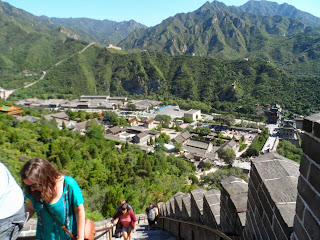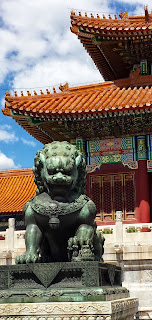Jintang, Chengdu,
Sichuan Province (09/09/2013)
Location: Arts and Sciences College of Sichuan Normal University
Population: 35,000 students
不闻不若闻之,闻之不若见之,见之不若知之,知之不若行之;学至于行之而止矣
不聞不若聞之,聞之不若見之,見之不若知之,知之不若行之;學至於行之而止矣
(Bù
wén bù ruò wén zhī, wén zhī bù ruò jiàn zhī, jiàn zhī bù
ruò zhīzhī, zhīzhī bù ruò xíng zhī; xué zhìyú xíng zhī
ér zhǐ yǐ)
'Tell
me and I’ll forget; show me and I may remember; involve me and I’ll
understand'
Chinese
Proverb
'Good
Morning, Rachel!'
It is
Monday morning and I have just been enthusiastically greeted by my
first class of twenty second year university students as I walk through my
classroom door. They are already seated in neat rows at the front of the
room, paper out, pens at the ready, smiling and eager and ready to
learn.
They
are also twenty five minutes early to my lesson.
It
could only be China. Teaching
here is always an adventure. Sometimes it's frustrating
and exhausting and you want to bang your head (or the students)
against your desk just to get a response other than blank bemusement.

Sometimes you have to trick them into speaking because through a deadly combination of shyness, Chinese teaching methodology (students should be seen and not heard) and puzzlement at the mad Englishwoman gesticulating at the front of the classroom they are occasionally struck dumb. I put them in groups and sneakily sit next to them to hear them speak. I set True or False quizzes, making them stand up if they think it's false and sit down if they think it's true. Five questions in they're so sick of mimicking a jack in the box they're yelling the answers at me. Sneaky plan success.
Sometimes
it's worrying. A lesson on family ends with us discussing the royal
family and what the students would do if they were King or Queen for
the day. Most of them help the poor, or go shopping or travelling.
And then there's the student who stares in utter bafflement because
they have genuinely no idea. There's also the student who grins and
offers up the suggestion of 'killing the King and Queen because then
I could do what I liked.'
It's
difficult to know which is more terrifying- the pupil with the
Machiavellian streak or the student with no imagination.
Most
of the time though it's brilliant and hilarious
and very easy to feel a great deal of affection for your students.
One day, for example, teaching body parts and
illness, we role play
going to the doctor and I circle the class
listening to them pretending
to be ill. Then this genius bit of acting
happens:
Boy
One (clutching his stomach and groaning):
Oh Doctor, I am very ill.Boy Two (feeling his forehead): What's wrong?
Boy
One: I am pregnant.
Boy Two (laughing): What? And who is the father?
Boy One: You are.
Boy Two (laughing): What? And who is the father?
Boy One: You are.
It's
the moment when a student successfully uses the right words you've
taught, then makes an imaginative leap and can make a joke in English
that makes teaching worthwhile. Or seeing one student gently help
another who is struggling to think of the right word. Or watching
them pretend to give a news report, faces creased in concentration as
they recall the correct vocabulary and intonation.
There's a proverb in China that if you actively involve children in your lessons they'll learn and remember. So I make no apology for playing a lot of games with my students. Rock, paper, scissors. Pictionary. Charades. Twenty questions. Hangman. Anagrams. My students stick post-it notes on 'volunteers' (read: victims) to learn body parts. We watch and discuss film clips to illustrate points I've made in the lesson. Blackadder, Robin Hood, Man Vs Food. The more disgusting, funny or scary the better. We listen to songs to work out the lyrics: Rihanna's California Kingbed is good for doing body parts, Adam and the Ants' Stand and Deliver for crime, Madness' Our House for family, (though it's only as I'm watching that I wonder whether it's culturally appropriate for my class to be watching a man in drag play mother round a house).
 My
students are kind in unexpected ways. They leave me greetings on the
blackboards. They set up the computer for me before I get to lesson,
close curtains, find missing erasers, offer me their food, fill up my
water bottle and take me into town to show me where to buy the best
snacks. One of my students, Stephanie, makes it her personal mission
to get my trousers turned up because 'Teacher, I am very concerned
your pants are too long. We shall go and make them shorter.'
My
students are kind in unexpected ways. They leave me greetings on the
blackboards. They set up the computer for me before I get to lesson,
close curtains, find missing erasers, offer me their food, fill up my
water bottle and take me into town to show me where to buy the best
snacks. One of my students, Stephanie, makes it her personal mission
to get my trousers turned up because 'Teacher, I am very concerned
your pants are too long. We shall go and make them shorter.'
Our
first weekend in Chengdu and unsure how to get back to the
university, a student who speaks very little English buys bus tickets
for me and G, shows us the correct bus, travels with us, then hails
and pays for a taxi for us once we reach the local town afterwards.
She flatly refuses any offer of reimbursement.
Being
a teacher here is often funny and sometimes difficult and mostly
amazing but always a privilege. Nothing will compare to that first
moment, standing in front of twenty eager faces and opening my
mouth and teaching. It
felt odd and amazing and right. Like I'd always done it.
That
first lesson, one of my students brings a note explaining their
friend cannot come. I open the letter, expecting a few vague lines
about illness and promises of future attendance.
Instead
it begins:'Dear Honorified Rachel...'















